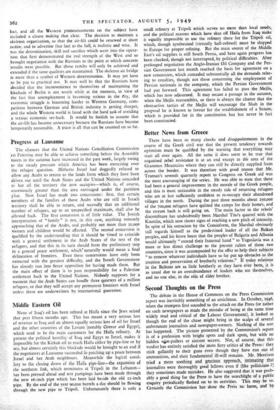Progress at Lausanne
The chances that the United Nations Conciliation Commission on Palestine may be able to achieve something before the Assembly meets in the autumn have increased in the past week, largely owing to the steady pressure which America has been exercising over the refugee question. Hitherto Israel had doggedly refused to allow any Arabs to return to the lands from which they have been driven out until the Arab States and the United Nations conceded to her all the territory she now occupies—which is, of course, enormously greater than the area envisaged under the partition plan. Now Israel has made two concessions: first, that certain members of the families of those Arabs who arc still in Israeli territory shall be able to return, and secondly that an additional number of refugees, up to an unspecified maximum, shall also be allowed back. The first concession is of little value. The Jewish interpretation of " family " is not, in this case, anything remotely approaching that of the Arabs, and probably not more than 20,000 women and children would be affected. The second concession is qualified by the understanding that it should be timed to coincide with a general settlement in the Arab States of the rest of the refugees, and that this in its turn should form the preliminary step in a general peace settlement, which' naturally would mean a final delineation of frontiers. Even these concessions have only been extracted with the greatest difficulty, and the Israeli Government has already run into fierce opposition for having made them. But the main effect of them is to pass responsibility for a Palestine settlement back to the United Nations. Nobody supposes for a moment that the Arab States can handle three quarters of a million refugees, or that they will accept any permanent frontiers with Israel unless these are underwritten by international guarantee.


































 Previous page
Previous page